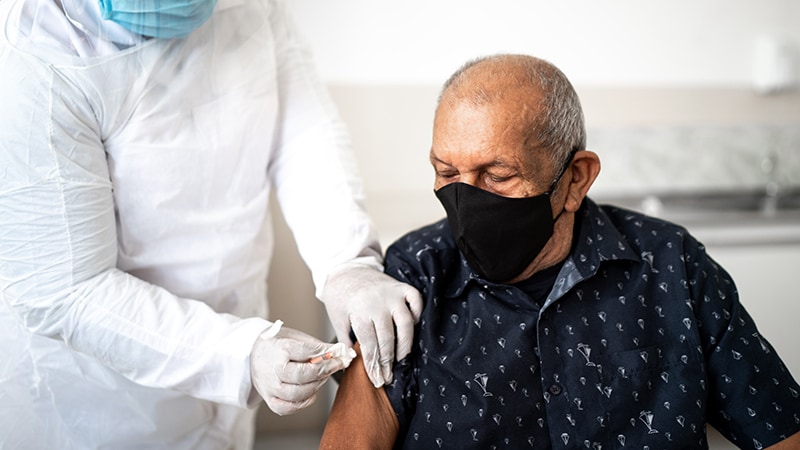— Durable responses across all three major subtypes of breast cancer
by
Charles Bankhead, Senior Editor, MedPage Today
October 10, 2023
Last Updated October 13, 2023
An antibody-drug conjugate (ADC) targeting HER3 produced objective responses in as many as 43% of patients with advanced breast cancer, a prospective clinical trial showed.
Responses to patritumab deruxtecan (HER3-DXd) occurred in the three major types of breast cancer, ranging from 22.6% in triple-negative breast cancer (TNBC) to 30.1% in hormone receptor (HR)-positive/HER2-negative breast cancer to 43% in HER2-positive breast cancer. Responses occurred in tumors with HER3-high and HER3-low membrane expression.
The activity came with considerable toxicity, however, including grade ≥3 treatment-emergent adverse events (TEAEs) in more than 70% of patients, but a relatively low 9.9% discontinuation rate, reported Ian E. Krop, MD, PhD, of Yale Cancer Center in New Haven, Connecticut, and coauthors in the Journal of Clinical Oncology (JCO).
“This article is the first comprehensive analysis of HER3-DXd in patients with advanced breast cancer and demonstrates clinically meaningful antitumor activity in a heavily pretreated patient population across a range of HER3 expression,” the authors stated in the discussion of their findings. “Durable antitumor activity was seen across clinical subtypes, and antitumor activity was also observed in patients with HER2+ disease who had HER2-low or HER2-zero protein expression.”
The authors characterized the safety profile as manageable and suggested that alternative dosing regimens may help reduce the rate of grade ≥3 thrombocytopenia and neutropenia.
Discussing the clinical relevance of the study, JCO senior deputy editor Kathy D. Miller, MD, wrote, “This is the first study to clearly demonstrate efficacy with a HER3-targeted therapeutic. Whether prior treatment with other ADCs reduces activity is a critical clinical question not addressed in this initial study.”
A study reported at the 2023 American Society of Clinical Oncology meeting showed a 35% overall response rate with HER3-DXd in patients with heavily pretreated metastatic breast cancer. The response rate was similar in patients with ≥75% HER3 expression and those with 25-74% expression. Grade ≥3 treatment-related adverse events occurred in 19 of 60 patients (32%).
HER3-DXd also has proven active in heavily pretreated, EGFR-mutant non-small cell lung cancer.
HER3 is highly expressed in breast cancer and other solid tumors and is associated with poor prognoses. No HER3-targeted therapy has been approved for any cancer indication. HER3-DXd consists of a human IgG1 monoclonal antibody bonded to a topoisomerase I inhibitor. In xenograft models and in vitro studies, HER3-DXd demonstrated activity across a range of HER3 expression levels and against chemotherapy-resistant breast cancer cell lines.
Krop and coauthors reported findings from a two-part dose-finding, dose-escalation, and dose-expansion study involving patients with previously treated, HER3-expressing advanced breast cancer. Data analysis included 182 patients who had received a median of five prior treatments for advanced breast cancer. The study population included 113 patients with HR-positive/HER2-negative breast cancer, 53 with TNBC, and 14 with HER2-positive disease.
The efficacy analysis showed activity in all three major breast cancer subgroups represented in the trial. Median duration of response was 5.9 months for TNBC, 7.2 months for HR-positive disease, and 8.3 months for HER2-positive breast cancers.
The median progression-free survival (PFS) was 5.5 months in TNBC, 7.4 months in HR-positive/HER2-negative disease, and 11.0 months in the small number of patients with HER2-positive breast cancer. Median overall survival (OS) was 14.6 months in the HR-positive subgroup, 14.6 months in the TNBC group, and 19.5 months in the HER2-positive patients.
Dose-limiting toxicities consisted of decreased platelet count and elevated aminotransferases. In the dose-expansion phase, gastrointestinal and hematologic toxicities were the most common TEAEs. TEAEs included three cases of grade 3 interstitial lung disease (ILD) and one grade 5 (fatal) ILD.
“Effective treatment options for this patient population are limited,” the authors wrote of their findings. “Treatments in the later-line setting are not standardized, and outcomes are suboptimal, particularly for patients with HER2-[negative] breast cancer.”
The results compare favorably with those obtained in recent trials of the Trop-2-targeted ADC sacituzumab govitecan (Trodelvy), the authors continued, including a median OS of 14.4 months in HR-positive/HER2-negative breast cancer and about 12 months in patients with TNBC. Collectively, the data support continued exploration of ADCs as a treatment paradigm for advanced breast cancer.
![author['full_name']](data:image/svg+xml;base64,PHN2ZyB4bWxucz0iaHR0cDovL3d3dy53My5vcmcvMjAwMC9zdmciIHdpZHRoPSI1MCIgaGVpZ2h0PSI1MCIgdmlld0JveD0iMCAwIDUwIDUwIj48cmVjdCB3aWR0aD0iMTAwJSIgaGVpZ2h0PSIxMDAlIiBzdHlsZT0iZmlsbDojY2ZkNGRiO2ZpbGwtb3BhY2l0eTogMC4xOyIvPjwvc3ZnPg==)
Charles Bankhead is senior editor for oncology and also covers urology, dermatology, and ophthalmology. He joined MedPage Today in 2007. Follow
Disclosures
The study was supported by Daiichi Sankyo.
Krop disclosed relationships with Freeline Therapeutics, PureTech, Genentech/Roche, AstraZeneca, Seagen, Daiichi Sankyo, MacroGenics, Merck, Novartis, and Pfizer.
Primary Source
Journal of Clinical Oncology
Source Reference: Krop IE, et al “Patritumab deruxtecan (HER3-DXd), a human epidermal growth factor receptor 3-directed antibody-drug conjugate, in patients with previously treated human epidermal growth factor receptor 3-expressing metastatic breast cancer: A multicenter, phase I/II trial” J Clin Oncol 2023; DOI: 10.1200/JCO.23.00882.
Note: This article have been indexed to our site. We do not claim legitimacy, ownership or copyright of any of the content above. To see the article at original source Click Here



![author['full_name']](https://clf1.medpagetoday.com/media/images/author/charlesBankhead_188.jpg)










